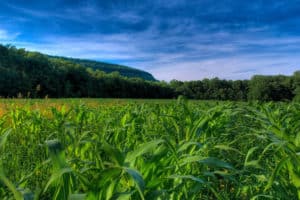1. County Clerk.
This individual may have a different title, but the job is essentially the same from state to state. The County Clerk works in the office where deeds, surveys, leases and other documents are recorded. Deeds are recorded in deed books; other documents may be recorded either in the deed books or in books devoted to one type of document, such as a survey book or a minerals book. This office is the place where you can track back the deeds into the seller’s property. The Clerk will show you how to use the County’s system and help you when you get stuck.
2. County Extension Agent.
Each state has an extension service that is affiliated with a state university. Most rural counties have an extension agent who is broadly familiar with local agriculture and has access to extension faculty at the university. Some extension agents are specialists in a particular commodity or subject matter, such as agricultural taxation, beef cattle, corn, orchard crops, vineyards, etc. Extension publications are useful—and range from introductory to advanced.
3. County Forester.
A county forester may work in one or more counties. He is a state employee whose job is to work with forest-owning landowners on ways to improve and manage their timber resource. He can help you estimate the value of your timber and put you in touch with private-sector consultants. He will also have information about forest-health issues, government cost-share programs, state seedling sales and forest-taxation questions. The county forester can put you in contact with the state’s timber-management program, which may offer a significant tax break for your participation. The state forestry department will usually produce publications, including a quarterly report on stumpage prices for each tree species, by in-state regions.
4. State geologist.
Every state has a geology program that over the years has identified mineral resources. Geological maps are available that cover your target property. These maps will indicate in general terms whether your property contains oil, gas, coal, hard-rock minerals and so on. Specialists are likely to be familiar with the area of your target property and its resources. The geology office will either have or, can direct you to, information on water resources, underground faults, karst formations, caves and earthquake hazards and so on. Most states will also have a department of mines and/or department of minerals, which issues permits and oversees mining and drilling. This department (s) will have records of past mineral production on your target property.
5. U.S. Department of Agriculture.
(Farm Service Agency and Natural Resources Conservation Service)
Somewhere in or near your target county, you will find a USDA Farm Service Agency (FSA) office. This is the gateway to USDA programs, ranging from crop subsidies to conservation programs and financing. The FSA office is likely to have an aerial photograph of your target property that you can copy. It should also have free copies of the county’s Soil Survey, whose maps will tell you the soils on your target property and whose tables will tell you the suitability of each soil type for construction, septic systems, timber productivity, wildlife and agriculture. Get a copy of your target county’s Soil Survey. The NRCS handles USDA conservation programs. NRCS can advise you on how to build, maintain and restore your soils; you may want to participate in the cost-share programs that encourage certain practices. In the West, you may also need to touch base with the local office of the U.S. Department of Interior’s Bureau of Land Management.
6. County Sanitarian or County Health Department.
This individual is responsible for approving new septic systems and wells. You will find in this office a permit for any approved septic system on your target property. Try to fit your plans to the existing septic system, because new systems involve an approval hassle and are expensive to boot. The sanitarian may be willing to help you find a suitable septic site at no cost.
7. Building and Zoning Official(s).
Several individuals may have these responsibilities in your target county. One will be responsible for issuing building permits and inspecting new construction, including remodeling jobs. You will need to pay for a building permit before starting work. Your plans may be reviewed. The zoning official will be involved to make sure your construction and use conforms to the zoning classification of the property. If your plans change the use, then you will have to get the property rezoned or acquire a variance or a conditional-use permit. You can get a copy of the zoning ordinance in this office and a copy of the building rules as well.
8. County Road Superintendent.
This official may be either a state or county employee. He can tell you about publicly maintained roads on, adjacent to and near your target property. He can tell you about maintenance and snow removal. (Some remote public roads are not plowed in the winter; some places are so remote that school-bus service is unavailable. If you are building a new road entrance onto a publicly maintained road, this official will provide you with the rules—so much sight distance in both directions, the diameter of a culvert if one is necessary, the width of the new opening, etc.
9. www.topozone.com
www.topozone.com is one of several online resources that supplies free topographical maps. Fill in the name of a town or geographic feature near your target property, then maneuver the map until you have the property centered. Other services are available for a fee.
10. An institutional lender that you’re pretty sure you don’t want to borrow from.
Use this lender’s loan officer as a trial run. Give him your financials and walk him through what you want in terms of your target property. He’ll give you a first-cut reaction to your proposal and may get a copy of your credit report and FICO rating. His evaluation will help you fine-tune your financials and proposal before submitting them to your preferred lenders.
This content may not be used or reproduced in any manner whatsoever, in part or in whole, without written permission of LANDTHINK. Use of this content without permission is a violation of federal copyright law. The articles, posts, comments, opinions and information provided by LANDTHINK are for informational and research purposes only and DOES NOT substitute or coincide with the advice of an attorney, accountant, real estate broker or any other licensed real estate professional. LANDTHINK strongly advises visitors and readers to seek their own professional guidance and advice related to buying, investing in or selling real estate.









Ttopozone.com isn’t free. They’re owned by Trails.com and charge up to $50/year for access to their website – and their maps aren’t that great or accurate.
This article is dated April, 06. Topozone has changed its policy since I wrote the column.
Curtis
I have thoroughly enjoyed reading your articles in Landflip. They really answer a lot of questions — I have always wanted to have a farm (second home) or timberland. We live in Mobile, so it would need to be about 1 or 2 hours from here. I don’t want to pay over $500 an acre, and only want about 50 or 60 acres — is this possible in Alabama? I am in real estate (residential) and mostly retired, so don’t want to invest too much, but it would be cash. Let me know if you know of anything interesting. Timber would probably be better at my age with someone managing it. Are there limits as to how much acreage is needed ? Carolyn